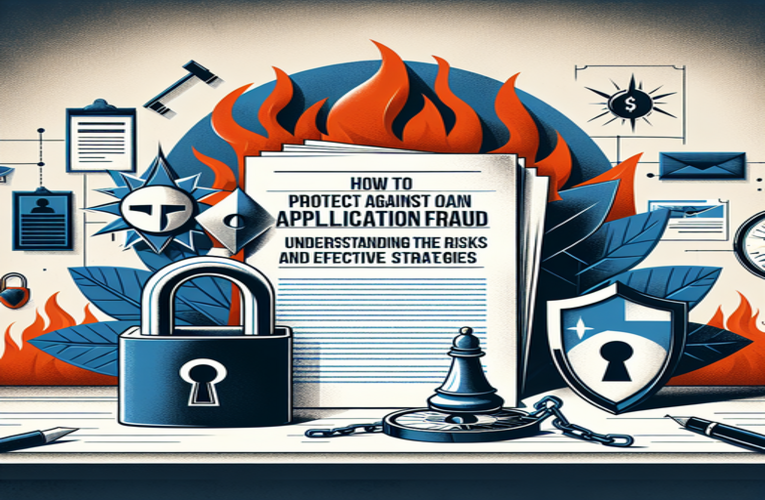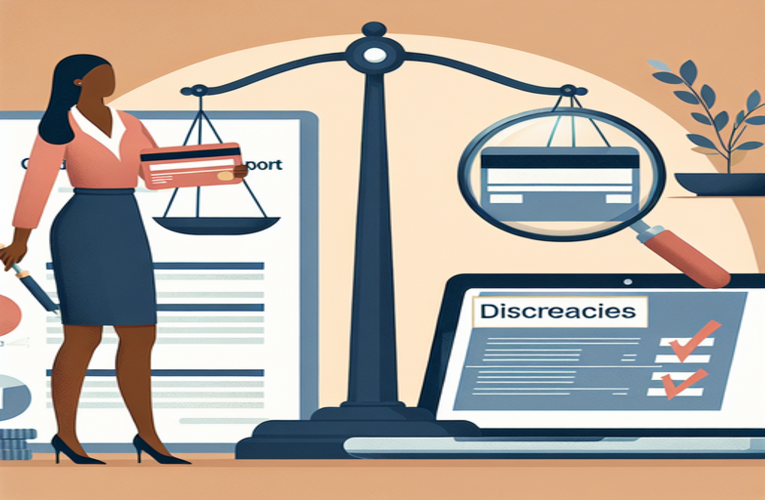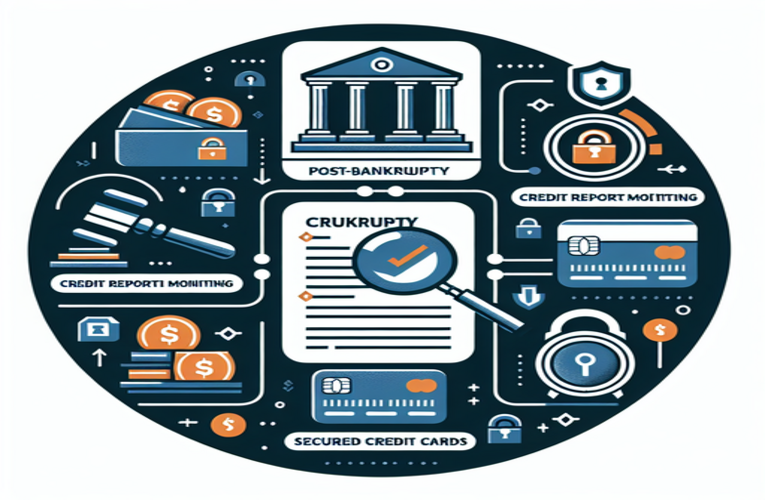How to navigate credit score discrepancies: a guide to resolving errors and disputes
In today’s financial landscape, maintaining a healthy credit score is paramount for achieving your financial goals. Whether you are looking to secure a loan, rent an apartment, or obtain affordable insurance rates, your credit report plays a crucial role in these decisions. However, errors and discrepancies on your credit report can jeopardize your financial well-being. In this article, we will delve into how to effectively address errors in your credit report, manage credit score discrepancies, and correct inaccuracies to improve your financial stability.
Understanding how to resolve discrepancies and correct errors is key to enhancing your credit score. In this article, we will discuss:
- Steps to identify and dispute errors and discrepancies on your credit report.
- The importance of regularly monitoring your credit report for inaccuracies.
- How to effectively interact with credit reporting agencies to correct mistakes.
- Strategies for ensuring long-term financial stability by managing your credit health.
By taking proactive steps to address inaccuracies, resolving credit score discrepancies, and maintaining vigilant oversight of your credit report, you can significantly improve your creditworthiness and open doors to greater financial opportunities. Let’s explore how to take charge of your credit health and effectively manage any discrepancies that may arise.
Table of Contents
How to Effectively Address Errors in Your Credit Report to Enhance Your Credit Score
Addressing errors in your credit report is a crucial step towards improving your credit score and overall financial health. Understanding how to navigate credit score discrepancies empowers you to ensure that your credit history accurately reflects your financial behavior. It is essential to recognize your legal right under the Fair Credit Reporting Act (FCRA) to dispute any inaccuracies. Common errors may include incorrect personal information, accounts that do not belong to you, or erroneous late payment records. When such discrepancies are identified, the first step is to contact the relevant credit reporting agency—Experian, Equifax, or TransUnion—to initiate the correction process.
Steps to Dispute Credit Report Errors
- Identify Errors: Obtain a free copy of your credit report from each of the three major credit bureaus through AnnualCreditReport.com. Review each report meticulously for inaccuracies, such as accounts you did not open, incorrect balances, outdated information, or misspellings in your personal details.
- Contact the Credit Agency: Reach out to the credit bureau that provided the report containing errors. You can contact Experian, Equifax, or TransUnion via mail, phone, or their online dispute system. Ensure you follow their specified procedures for submitting a dispute.
- Write a Detailed Dispute Letter: Draft a formal letter clearly identifying each disputed item in your credit report. For each item, explain precisely why you believe it is incorrect and request its removal or correction. Include:
- Your full name and address
- A copy of the credit report with the errors highlighted
- Copies (not originals) of documents that support your position, such as payment records or identity theft reports
- Send via Certified Mail: Mail your dispute letter and supporting documents via certified mail with a return receipt requested. This provides proof of the dispute being sent and received, establishing a paper trail for future reference.
- Await Investigation: Under the FCRA, credit bureaus are required to investigate disputes generally within 30 days. They will contact the furnisher of the information (such as a bank or lender) to verify the accuracy of the data in question.
- Monitor Changes and Follow Up: After the investigation, the credit bureau must provide you with the results in writing. If any changes are made, you should receive a free copy of your updated credit report. If the dispute is not resolved in your favor, you can request that a statement of the dispute be included in your file and in future reports.
Importance of Monitoring Credit Reports
Continuous monitoring of your credit reports is vital to ensure that any corrections are accurately reflected and to identify any lingering errors or new discrepancies that may require further action. Regular monitoring helps in early detection of fraudulent activities, such as identity theft, where unauthorized accounts or charges appear on your report. Utilizing credit monitoring services, setting up fraud alerts, or freezing your credit are proactive measures to protect your credit profile.
Impact of Your Credit Score
- Loan Eligibility: Lenders use your credit score to determine your eligibility for loans and credit cards. A higher credit score can result in better interest rates and terms, potentially saving you thousands of dollars over the life of a loan.
- Job Prospects: Some employers may review your credit history (with your permission) as part of the hiring process, especially for positions that require handling money or sensitive information. A poor credit report can impact their hiring decision.
- Insurance Premiums: Insurance companies may use credit-based insurance scores to set premiums for auto and home insurance policies. A lower credit score might lead to higher premiums.
- Housing Rental Opportunities: Landlords often review credit reports to assess the financial responsibility of potential tenants. A strong credit report can improve your chances of securing a rental property and may affect deposit amounts.
Mastering the process of resolving credit report errors and understanding how to navigate credit score discrepancies can significantly improve your financial health and open doors to better opportunities. By diligently following through with disputes, you ensure that your credit report accurately represents your financial behavior, which is crucial when seeking loans, mortgages, or even new employment. Being proactive in correcting inaccuracies not only enhances your credit score but also strengthens your overall financial standing.
By being proactive and attentive regarding your credit report, you not only protect your financial identity but also lay the groundwork for a more favorable credit profile. Remember, each step you take towards correcting inaccuracies can lead to substantial long-term benefits in your financial journey.
Understanding the Role of Credit Reporting Agencies in Addressing Discrepancies
When dealing with credit score discrepancies, understanding the function of credit reporting agencies is essential. These agencies—Experian, Equifax, and TransUnion—maintain comprehensive databases that document consumers’ credit histories, encompassing details about credit accounts, payment patterns, outstanding obligations, public records, and inquiries. Their primary role involves collecting, updating, and distributing this information to lenders, financial institutions, insurance companies, and sometimes employers, who use it to evaluate an individual’s creditworthiness and financial reliability. Recognizing how these agencies operate can help you more effectively dispute inaccuracies and ensure your credit report reflects accurate information.
Key Steps to Address Credit Report Errors
- Identify the Error: Thoroughly examine your credit reports from each bureau to pinpoint inaccuracies, such as accounts that are not yours, incorrect balances, or payment histories. Pay special attention to negative items that can significantly impact your credit score.
- Contact the Agency: Reach out directly to the credit bureaus that are reporting the error. Each bureau may have different procedures, so it is important to follow their specific guidelines. Provide all necessary information to support your claim.
- Initiate a Formal Dispute: Start the official dispute process by submitting a dispute online, by mail, or by phone. Clearly state the item you are disputing, explain why it is incorrect, and request that it be corrected or removed. Provide copies of any supporting documents.
- Understand Your Rights Under FCRA: The Fair Credit Reporting Act mandates that credit bureaus must investigate your dispute within 30 days, unless they consider it frivolous. They must also forward all relevant data you provide about the dispute to the information provider.
- Data Rectification and Follow-Up: If the information provider finds the disputed information to be inaccurate, they must notify all three bureaus so they can correct the information in your file. After the investigation, the bureau must give you the results in writing and a free copy of your report if the dispute results in a change.
Benefits of Timely Dispute Resolution
- Improved Credit Score: Correcting errors can lead to an immediate boost in your credit score, enhancing your eligibility for loans and credit cards with favorable terms.
- Better Financial Decisions: A higher credit score can result in lower interest rates on mortgages, auto loans, and credit cards, saving you money over time.
- Securing Housing Opportunities: With an accurate and improved credit report, you increase your chances of being approved for rental properties, as landlords often check credit histories to assess potential tenants.
- Affordable Insurance Rates: Since insurers may adjust premiums based on credit scores, resolving discrepancies can lead to more reasonable insurance rates for auto or homeowner policies.
Strategies for Long-term Financial Stability
Proactive communication with credit reporting agencies not only allows consumers to correct their credit histories but also empowers them to protect their long-term financial stability. Key strategies include:
- Regular Review: Establish a consistent schedule to review your credit reports from all three bureaus at least once a year or before major financial decisions.
- Habitual Monitoring: Sign up for credit monitoring services that alert you to changes in your credit report, enabling you to respond quickly to potential fraud or errors.
- Informed Decisions: Use your credit report to understand your financial standing and make informed decisions about taking on new credit or debt.
- Maintain Good Credit Habits: Pay your bills on time, keep credit card balances low, and limit new credit inquiries to maintain a strong credit profile.
Grasping how credit reporting agencies operate provides essential insights that enable consumers to advocate for their credit rights. Engaging with these agencies can serve as a critical strategy for preserving financial health and optimizing credit opportunities.
Actions to Take After Submitting a Dispute with Your Credit Reporting Agency
Once you have submitted a dispute regarding inaccuracies in your credit report, it is essential to proactively manage the process to effectively resolve credit score discrepancies and safeguard your financial well-being. Understanding the steps to follow after initiating a dispute can enhance the likelihood of a favorable outcome and ensure that your credit report accurately reflects your credit history.
Steps to Follow:
- Stay Organized: Keep a dedicated file or digital folder for all correspondence related to your dispute. This should include copies of your dispute letters, evidence submitted, postal receipts, and any responses from the credit bureaus. Maintaining thorough records ensures you have a clear timeline and evidence of your efforts should you need to escalate the dispute.
- Maintain Communication: Be proactive in following up with the credit bureaus if you do not receive a response within the expected timeframe. If the dispute is resolved in your favor, verify that the corrections are reflected in all your credit reports. If your dispute is rejected, request a detailed explanation and consider disputing the item directly with the creditor or adding a consumer statement to your report.
- Use Tracking Tools: Enroll in credit monitoring services that notify you of changes to your credit report, such as new accounts, inquiries, or changes to existing accounts. These tools can help you detect and respond to unauthorized activities or errors promptly, minimizing potential damage to your credit score.
Benefits of Credit Monitoring:
- Early Detection of Fraud: Credit monitoring helps identify signs of identity theft, enabling you to take immediate action to protect your finances.
- Improved Credit Management: Regular updates on your credit activity allow you to better manage your credit usage and make informed decisions about applying for new credit.
- Peace of Mind: Knowing that your credit is being monitored can reduce stress and help you feel more secure about your financial health.
If you encounter difficulties, consider seeking guidance from external resources such as credit counseling agencies or legal professionals specializing in consumer rights. These experienced professionals can help you understand your rights under consumer protection laws, negotiate with creditors on your behalf, and provide personalized strategies for resolving credit report inaccuracies. Non-profit credit counseling organizations can also assist in developing debt management plans to improve your overall financial situation.
By prioritizing these actions, you can significantly improve your chances of rectifying your credit report and enhancing your credit score over time. Taking control of your credit information empowers you to achieve financial goals such as qualifying for better loan terms, securing housing, and protecting your financial reputation.
Summary
Understanding your credit report is essential for maintaining a healthy credit score and effectively navigating credit score discrepancies. Here are the crucial steps and strategies discussed in the article:
- Identify Errors: Regularly review your credit report for inaccuracies such as misspellings or incorrect account details to detect discrepancies in your credit information.
- Contact Credit Agency: If you find errors, reach out to credit reporting agencies like Experian, Equifax, or TransUnion to address inconsistencies in your credit report.
- Dispute Errors: Submit a well-documented dispute letter via certified mail to initiate an investigation and correct any inaccuracies affecting your credit score.
- Monitor Changes: Keep track of your credit report for any adjustments following your dispute to ensure discrepancies are resolved.
- Stay Organized: Maintain records of all communication and submissions regarding your dispute to effectively manage and resolve credit report discrepancies.
The impact of your credit score extends to loan eligibility, job prospects, insurance premiums, and rental opportunities, making it vital to address credit report inaccuracies swiftly. Establishing a routine to monitor your credit will empower you to resolve discrepancies, make informed financial decisions, and help maintain your long-term financial stability.
Prioritize these actions to effectively navigate credit score discrepancies, improve your credit report, and enhance your credit score over time.
FAQ
1. What common errors should I look for in my credit report?
Common errors on your credit report include misspelled names, incorrect payment dates, fraudulent accounts that do not belong to you, and outdated information regarding loans, credit cards, and payment histories.
2. How often should I check my credit report?
It is advisable to review your credit report at least once a year. However, regularly monitoring it quarterly or even monthly can help you promptly catch and address any inaccuracies or fraudulent activities.
3. Can I dispute errors on my credit report for free?
Yes, under federal law, you have the right to dispute any errors on your credit report at no cost. Credit bureaus must investigate inaccuracies without charging you any fees to contest them.
4. What happens if I do not receive a response from the credit agency?
If you do not receive a response from the credit reporting agency within 30 days, it’s important to follow up with them. Ensuring your dispute is being addressed is crucial for correcting your credit history.
5. Are there specific documents I should include in my dispute letter?
Yes, when filing a dispute, include your complete contact details, a copy of your credit report highlighting the errors, and any supporting documentation such as bank statements, payment confirmations, or correspondence related to the disputed items.
6. How long will it take to resolve my dispute?
Credit reporting agencies are required to investigate your dispute within 30 days. However, the overall time to resolve the issue may vary depending on the complexity of the case and the responsiveness of involved parties.
7. What should I do if my dispute is rejected?
If your dispute is rejected, you can request clarification from the credit bureau, consider filing a complaint with the Consumer Financial Protection Bureau (CFPB), or seek advice from a credit counselor to explore further options.
8. Will disputing an error impact my credit score?
Disputing an error on your credit report will not negatively affect your credit score. In fact, correcting inaccuracies can lead to an improvement in your credit rating over time.
9. What is the Fair Credit Reporting Act (FCRA)?
The Fair Credit Reporting Act (FCRA) is a federal law designed to protect consumers by regulating how credit reporting agencies handle personal information and ensure the accuracy and fairness of credit reports.
10. How can I use credit monitoring services effectively?
Utilize credit monitoring services to receive real-time alerts for any changes to your credit report. These services help you track your credit score’s evolution, detect potential fraud early, and maintain a healthy credit history.



















